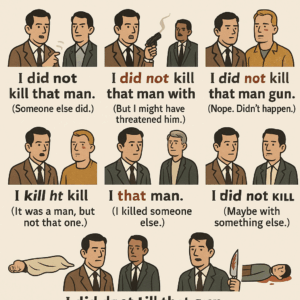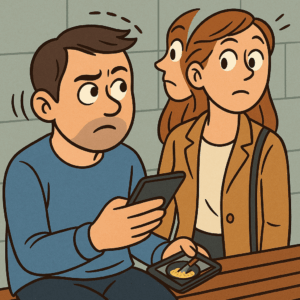How tone, gaze, and subtext still beat AI in human connection
“Yeah?”
He looked up with raised brows. A single syllable, stretched or clipped, curious or cynical. It’s such a small word. But it’s a full-blown symphony of human intent.
Tone is everything.
Yeah. — I know.
Yeeeah… — I think I know, or I’m pretending I do.
Yeah yeah — I’ve heard enough, move along.
Yéah yéah yéah yéah — sure, buddy. Whatever you say.
Dutch intonation is a masterclass of its own. Once you tune in, you hear it everywhere. Meaning drips from length, pitch, rhythm—not just the word itself. I just call it life. Language nerds call it “prosody.”
The Emphasis Experiment
It reminded me of that classic linguistic example:
“I did not kill that man with a gun.”
Try saying it seven times, each time emphasizing a different word
- I did not kill that man with a gun. (Someone else did.)
- I did not kill that man with a gun. (But I might have threatened him.)
- I did not kill that man with a gun. (Nope. Didn’t happen.)
- I did not kill that man with a gun. (But I injured him.)
- I did not kill that man with a gun. (It was a man, but not that one.)
- I did not kill that man with a gun. (I killed someone else.)
- I did not kill that man with a gun. (Maybe with something else.)

Same sentence. Seven radically different stories.
Words are cheap. Emphasis changes everything.
And that, dear reader, is the paradox of written text. We lose tone. We lose gaze. We lose… all the in-between. That’s why voice still matters—whether from our own vocal cords or synthesized ones.
Because reading a sentence is not the same as hearing it.
Whispered. Yelled. Sung. Sighed.
And it’s not just the loss of tone. It’s the loss of gaze—the direction of our attention, the tension of a look, the awkwardness of catching eyes. Voice may carry emotion, but our eyes broadcast intent. Just like tone, gaze carries a grammar of its own.
Glances, Guilt, and the Locker Room
Which brings me—quite literally—to the locker room.
Sunday. 45-minute swim class. My daughter splashing around. I’m downstairs early, towel in hand, scouting for one of the too-few dressing booths.
It’s a battlefield. Four stalls. Twenty kids. Twice as many parents. Elbows out. Tactical positioning.
Some break the rules: “Don’t occupy the stalls with your gear.” But they do it anyway. Backpack placement equals boot claim.
It’s chess, but with Crocs and Dora towels.
And then, the stares.
Because I’m standing there, hyper-aware of where I’m looking. Not out of guilt but out of principle. This is a sacred parental zone. Even a stray glance feels off. So I scan the floor tiles. The posters. That weird red sticker on the ceiling. Anywhere but people.
Then I hear it:
Schlop. Schlop.
Tomato chopping?
I glance right. A guy is watching a cooking video on his phone. One second. Tomato mystery solved.
But next to him? A woman. Locked in.

Not a glance. A full-screen stakeout. Ten seconds. Twenty. Still going. He looks up—she looks away. Two seconds later? She’s back at it. I’m witnessing an interactive surveillance ballet.
And it hits me: we don’t just communicate through words, tone, or emojis. We do it through glances. Through lingering. Through what we avoid and what we pretend not to notice.
She said nothing. But her eyes said:
“Who is this guy? What’s he watching? Is that a new recipe?”
I keep my phone in my pocket. No FaceTime. No smart glasses. No doomscrolling. Not because I’m better—because it feels wrong.
This space deserves analog presence.
Yes, I sound like a dad. Because I am a dad.
Why Any of This Still Matters
So why does this matter in 2025, when everyone’s prompt-engineering GPT-5o and customizing AI voices?
Because even now, we still rely on one of humanity’s oldest protocols:
Subtext.
The tilt of a head.
The pause before a “yeah.”
The way eyes meet—or don’t.
Almost every AI product today tries to flatten that. Reduce it to chat bubbles. To dropdowns.
But chat is less than 5% of communication.
What about tone? What about glance?
What about the moments when not responding is the loudest thing we can say?
So here’s your thought for the week:
Yes, AI is amazing. Language is evolving.
But never underestimate the orchestra behind a single word.
Especially when that word is just…
Yeah.
What's on your mind?